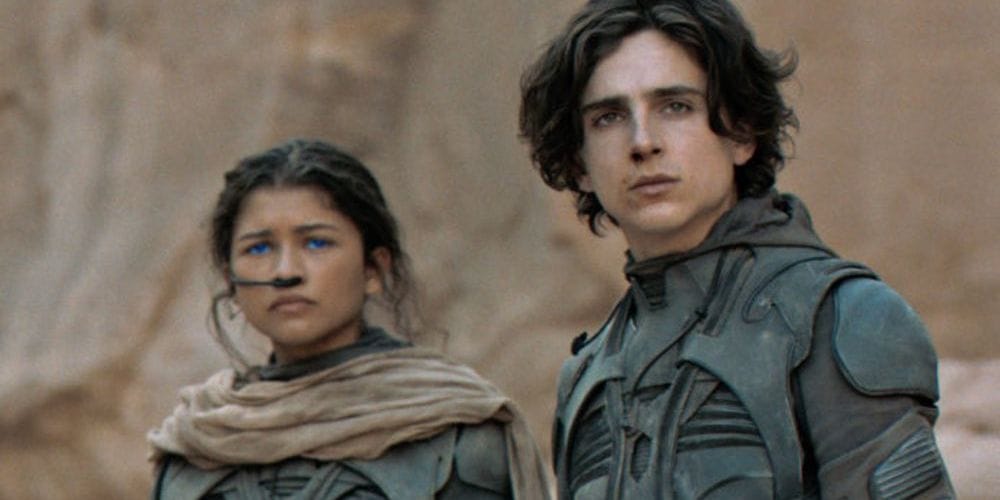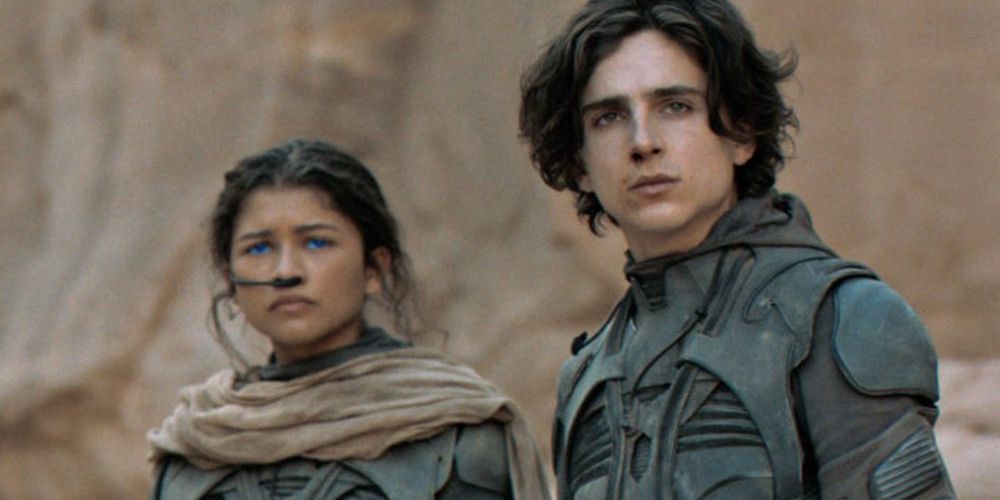Space Space Baby: Villeneuve's "Dune" Falls Flat
With a $165 million budget and an all-star cast, Denis Villeneuve's sci-fi epic "Dune" is one of the biggest films of the year. Staff writer Miles Garcia '25 gives his review, writing that for all its technical marvels, "Dune's" oversimplified plot leaves a hollow aftertaste.


How can a movie as expansive as Denis Villeneuve’s latest sci-fi epic “Dune” feel so small? Adapted from Frank Herbert’s hefty 1965 novel of the same name, the film version fails to translate much of the wordy, expository details of Herbert’s original source material to the big screen. Indeed, in each of Villeneuve’s new science fiction films (the previous two being “Arrival” and “Blade Runner 2049”), the scale of his stories have become too much for just one movie to handle. Perhaps that’s why we get a reminder within the opening minutes of “Dune” that this is just part one.
Since the world of this film is so unfathomably large, with rules that I didn’t have time to fully comprehend as an audience member who has read the book, the whole experience ends up overwhelming. Granted, I haven’t read the original novel, which is likely just as complicated as what I watched. Am I saying the film needed to be longer than two-and-a-half hours? Not exactly. But the time we do get seems to go to waste.
Villeneuve simplifies everything in Herbert’s book to its most basic level. He doesn’t give enough attention to the characters that need it — it’s often difficult to tell which characters are more important than others, or at least who they are beneath the movie-star personas we all know and love (Timothée Chalamet, Jason Mamoa, Oscar Isaac, a disappointingly underused Zendaya). And it gives too much attention to the generic futuristic landscape on display. For that reason, the film simultaneously does both too much and too little.
The story follows Paul (Timothée Chalamet) as he learns from his mother Jessica (Rebecca Ferguson) about some vague telepathic system of communication. At the same time, Paul is trying to follow in the footsteps of his father Duke Leto (Oscar Isaac), the leader of the people of Atreides on the planet Caladan. The plot really kicks into gear when Leto forfeits control over Caladan to make an alliance with the Fremen people who live on the planet Arrakis, a rich source of “spice,” a substance essential for interstellar travel.
The film does an okay job of making that nonsense I just wrote appear normal and comprehensible, which also belies the paradox of “Dune.” If it were to make these details any less digestible than they already are, it would be a complete mess. But by telling this story in such a dumbed down, simplistic way, the world of “Dune” can’t help but feel meaningless in itself. Multiple times I wondered why this film should have more value to me than the latest “Star Wars” or even Villeneuve’s previous two films. The effect of its compound mass of gibberish names and seemingly useless facts is an experience that, while not annoying, needs a better reason for existing. For “Dune” to justify its presentation as a film, it would need to use the medium in a way that could not be replicated in any other art form. More than an exposition dump, and more than a visualization of things that readers of the novel have already imagined for themselves. As it stands, a simple retelling of the novel, however faithful, doesn’t really entertain me as someone unfamiliar with the original.
However, if “Dune’s” primary goal from the start of its production was to be a technical marvel for moviegoers, it definitely succeeds at that. Villeneuve’s films are always visually striking and appealing, no matter how complicated the story and subject matter. “Dune” is no different. Every shot is careful and deliberate, creating a world that feels lived in, disconnected from the year 2021 and fully transporting us to a hypothetical 10191. Though the movie takes place mostly in a desert, Villeneuve and his cinematographer Greig Fraser find ways to effectively incorporate various color palettes. The film transitions from an orange-tinted evening in the desert to a bluish-green political meeting with ease, keeping every aspect of costume and production design feeling like they come from the same universe.
Beyond the beautiful designs showcased within each shot, “Dune” boasts exciting action sequences that combine the high-wire intensity of Christopher Nolan’s “Dunkirk” with the tangibility of the original “Star Wars” trilogy. The booming score also does its part to imbue climactic moments with a desolate sense of dread and chaos. Having watched the film on HBOMax, I can only imagine the chills that people who saw the film in a theater must have experienced.
But to what end? For every scene of theatrical thrills that do justify its cinematic context, “Dune” has two more filled with expository dialogue and derivative thematic ramblings. It’s worth seeing for yourself at a theater with your friends, but to understand the meaning behind the madness that is contained within these 155 minutes would be a cumbersome task. For how densely packed “Dune” is on the surface, the aftertaste is surprisingly hollow.





Comments ()